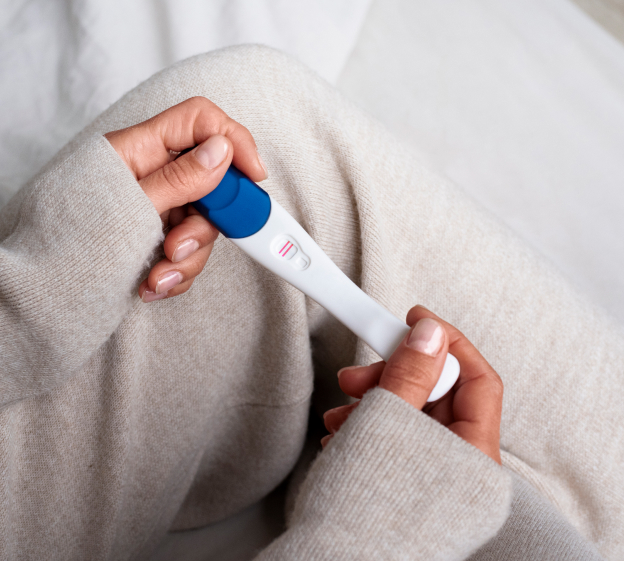The Wait Is Over: How Soon Can You Take a Pregnancy Test?
July 30, 2025Categories: Pregnancy & Childbirth, Maternity

You’ve had pregnancy and parenting on the mind, and now something’s different. Your menstrual cycle isn’t cycling, and you suspect you may be pregnant.
So, you bought an at-home pregnancy test. You want to use it right away, but you’re not sure how soon you can take a pregnancy test.
“The short answer is that you can take a test anytime you want,” says Melissa Mesenburg, DNP, APRN, FNP-C, board-certified family nurse practitioner with Beaufort Memorial Obstetrics & Gynecology Specialists. “However, if you want the most accurate results, you may need to wait just a little bit.”
How Long You Should Wait to Take a Pregnancy Test?
No matter when your monthly cycle went away, you don’t have to wait long to take a pregnancy test. You may even be able to take one right now if your period is late. According to the Office on Women’s Health, at-home tests are accurate nearly 99 percent of the time, and they can give correct results as early as the first day your period is late.
That said, a little bit of patience may pay off. Holding off just a few days after your missed period is due may help you get more accurate results. If you’re too eager to wait, buy more than one test. That way, you can take one test now and use the second one in a few days. This gives you some protection against a false positive or false negative result.
“No matter what the results of the first test, it’s a good idea to take a second test,” Mesenburg says. “This can help confirm or overrule your first results, in case you test too early.”
Read More: Ovulation Tests and Other Tools to Track Your Fertility
How an At-Home Pregnancy Test Works
No matter when you take a pregnancy test or what brand you use, they all work the same way. These tests look for human chorionic gonadotropin (hCG), a hormone linked to pregnancy. When a fertilized egg attaches to the inner uterine wall, the amount of hCG in your body increases. A pregnancy test detects how much is in your urine.
The amount of hCG is particularly high during the first 10 weeks after conception. It may be time for a pregnancy test if you experience early pregnancy symptoms, which include:
- Abdominal bloating or swelling
- Fatigue
- Needing to urinate more often than usual
- Tender, swollen breasts
- Vomiting or feeling nauseous, particularly in the morning
Read More: Your Pregnancy Journey: Rules of the Road
Accuracy Is in Your Hands
When you return home with a pregnancy test, be careful to read and follow the instructions closely.
“How soon you can take a pregnancy test is just one thing to consider for accurate results,” Mesenburg says. “Despite advances in at-home pregnancy tests, they’re only accurate if you use them properly.”
For the most accurate outcome, do the following:
- Check the date — Pregnancy tests expire. If yours is expired, get rid of it and buy a new one.
- Take it early — Your urine likely has higher levels of hCG first thing in the morning. If possible, take your test during your first bathroom break after a night of sleep.
- Urinate — Your test may require you to urinate on a test strip or in a cup. Either way, follow directions. Exposing the test strip to too much or too little urine can affect test results.
- Wait as directed — Your test takes a few minutes before giving results. Set an alarm for the required time and review the results.
Read More: What to Eat During Pregnancy
What to Do After Taking a Pregnancy Test
If the test shows a positive result, don’t start decorating the nursery and picking out baby names just yet. Instead, make a phone call.
“The first thing you should do after getting the results of an at-home pregnancy test is schedule an appointment with your primary care provider or OBGYN,” Mesenburg says. “This allows you to learn what to expect moving forward for a safe, healthy pregnancy for yourself and your baby.”
At your appointment, your healthcare provider may do the following:
- Confirm pregnancy — A urine or blood test can confirm that you’re pregnant. Blood tests can detect hCG as soon as six days after ovulation. If you’re more than six or seven weeks along, an ultrasound can visualize your developing baby.
- Give a physical — A Pap test and full pelvic exam helps detect any issues that need to be addressed to protect baby and you along the journey.
- Help you prepare — Your healthcare provider will prescribe prenatal vitamins, provide tips to manage pregnancy symptoms and answer your questions about pregnancy, prenatal care, delivery at the Collins Birthing Center and more.
- Review your health — Your health history may affect your pregnancy. Your healthcare provider will ask about past pregnancies, risky behavior, genetic issues, ongoing health problems and more.


